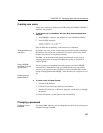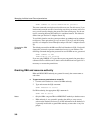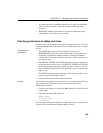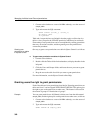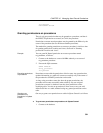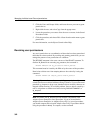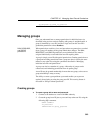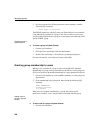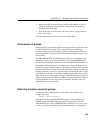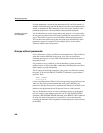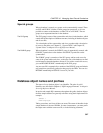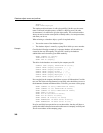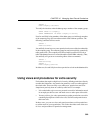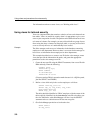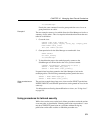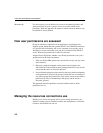
CHAPTER 10 Managing User IDs and Permissions
365
2 Double-click the Users and Groups folder for that database, to open it.
Groups are displayed in the left panel, and both users and groups are
displayed in the right panel.
3 In the right panel, select the users you want to add to a group, and drag
them to the group.
For more information, see the Sybase Central online Help.
Permissions of groups
Permissions may be granted to groups in exactly the same way as to any other
user ID. Permissions on tables, views, and procedures are inherited by
members of the group, including other groups and their members. There are
some complexities to group permissions that database administrators need to
keep in mind.
Notes
The DBA, RESOURCE, and GROUP permissions are not inherited by the
members of a group. Even if the
personnel user ID is granted RESOURCE
permissions, the members of
personnel do not have RESOURCE permissions.
Ownership of database objects is associated with a single user ID and is not
inherited by group members. If the user ID
personnel creates a table, then the
personnel user ID is the owner of that table and has the authority to make any
changes to the table, as well as to grant privileges concerning the table to other
users. Other user IDs who are members of
personnel are not the owners of this
table, and do not have these rights. If, however, SELECT authority is explicitly
granted to the
personnel user ID by the DBA or by the personnel user ID itself,
all group members do have select access to the table. In other words, only
granted permissions are inherited.
Referring to tables owned by groups
Groups are used for finding tables and procedures in the database. For
example, the query
SELECT * FROM SYSGROUPS
will always find the table SYSGROUPS, because all users belong to the
PUBLIC group and PUBLIC belongs to the SYS group which owns the
SYSGROUPS table. (The SYSGROUPS table contains a list of group_name,
member_name pairs representing the group memberships in your database.)



